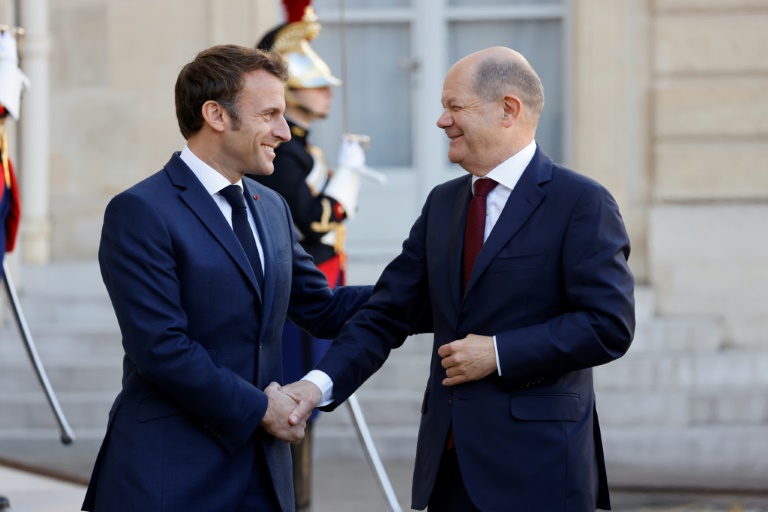Behind the smiles are deep differences between Emmanuel Macron (L) and Olaf Scholz
French President Emmanuel Macron hosted German Chancellor Olaf Scholz for lunch Wednesday, with both sides saying they made progress towards easing differences on energy and defence dogging the European Union’s vital double act.
The two leaders were “of one mind on the major directions” of policy, a German diplomatic source said after the meeting, while a source in the French presidency called it “very constructive”.
“Today was a very good and important conversation on European energy supply, rising prices and joint arms projects,” Scholz tweeted.
“Germany and France stand close together and are tackling challenges jointly”.
Macron and Scholz were at pains to put on a show of friendliness as Scholz climbed out of his black Mercedes on arrival, with both smiling and shaking hands.
The pair spoke for around an hour longer than planned, including a one-on-one session without advisors.
The German source said they discussed issues including “European energy policy, national energy policies, economic development, defence, space and foreign policy”.
Meanwhile the French presidency said the talks were “in a spirit of very close cooperation for the medium- and long-term”.
But Macron and Scholz did not appear before journalists to announce any joint decisions or take questions.
Recent weeks had seen growing signs of discord between Berlin and Paris, under pressure from Russia’s invasion of Ukraine and its knock-on effects especially on energy markets.
Berlin’s move to spend up to 200 billion euros ($200 billion) subsidising soaring gas prices and refusal to consider an EU-wide energy price cap nettled Paris and other European capitals, who fear the effect on their energy costs.
On defence, France is rattled by German plans for a shared missile shield with other NATO nations using American equipment, while longer-term projects to jointly develop new fighter jets and tanks appear stalled.
A big-spending “new era” of German defence policy announced by Scholz following the Russian attack has not translated into major contracts within Europe, especially for French firms as Macron hoped.
– ‘Motor has to work’ –
Wednesday’s meeting came instead of a postponed joint cabinet meeting between Paris and Berlin, which would have been Scholz’s first as chancellor.
So far, the German leader — in office for less than a year — has not developed the same warmth with Macron as his predecessor Angela Merkel, who “texted every day”, one French diplomatic source said ahead of the talks.
Strained ties between the EU’s two largest and most populous economies — in the past often the brokers of compromise among the bloc’s 27 members — have come at exactly the wrong time.
Russia’s invasion and the resulting disruption to the energy system have coincided with rising tensions between China and the West, as well as fears that more isolationist forces could return to power in Washington.
Berlin and Paris also differ on how to make the EU more agile faced with the new challenges, and how quickly to admit new members.
Macron warned that “both of us, together with the EU as a whole, are confronted with one of the biggest, furthest-reaching crises ever experienced by Europe,” with “a lot of work ahead,” the German diplomatic source said.
“Agreement between France and Germany is not sufficient, because everyone else has to agree, but it is necessary,” said Stephane Dion, Canadian ambassador to France and former envoy to Germany.
“They remain the motor of Europe. For Europe to work, that motor has to work,” he added.
– Tight deadline –
France’s Europe minister Laurence Boone told the Senate Wednesday that the two countries should aim to resolve their differences “by the 60th anniversary of the Elysee Treaty” on January 22.
Signed by post-war leaders Charles De Gaulle and Konrad Adenauer, the pact forms the foundations of French-German cooperation.
For now the two sides have agreed to set up “working groups… that will have the two governments working closely together towards the next steps in the coming days,” the Elysee said.
The groups cover topics including defence and security, energy and innovation, the German source said.
Macron and Scholz also agreed to talk “before and after” the German leader’s upcoming visit to China and the French president’s visit to the US, the German source said.










